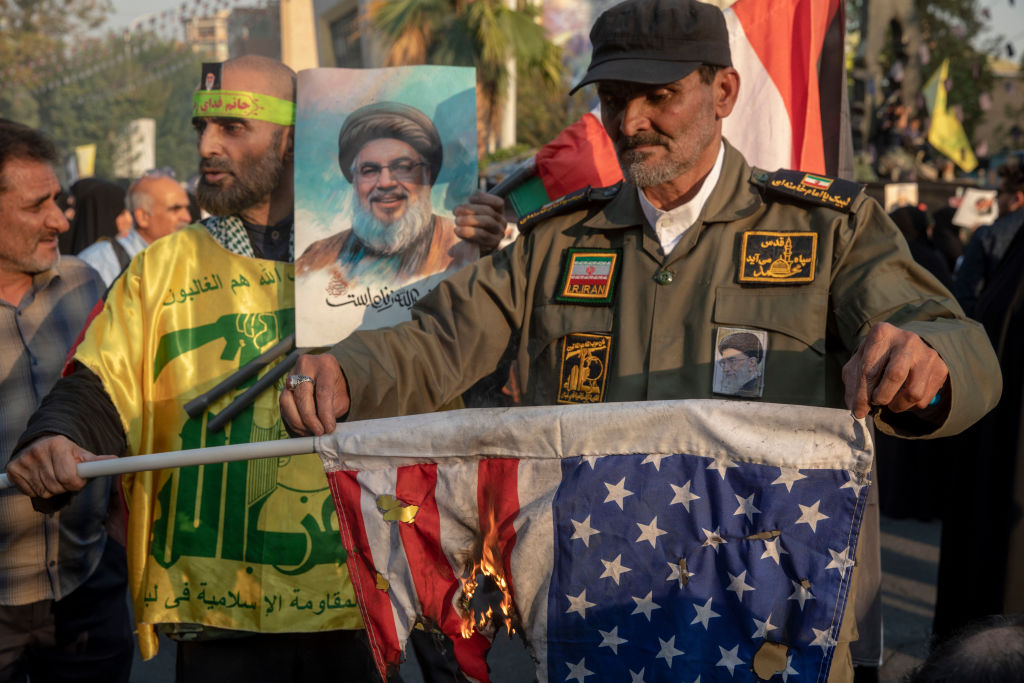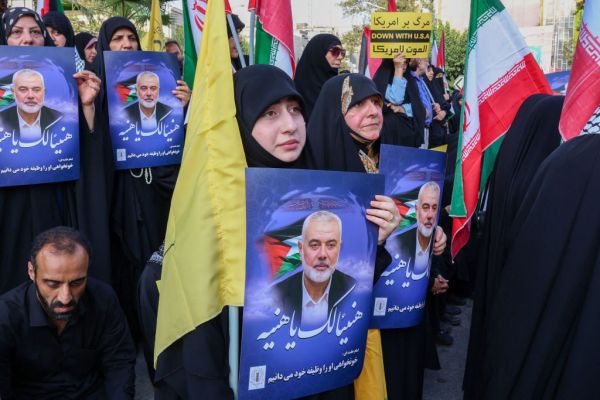Happy Thursday! Just when you thought the Dispatch birthday celebrations were over: But wait, there’s more! In honor of five years, we’re giving our members five free guest passes! Click here to generate your promo codes and send them to folks you think would like our style (and if they’re Packers fans, we promise to tone it down).
Quick Hits: Today’s Top Stories
- The Justice Department on Wednesday charged Nasir Ahmad Tawhedi—a 27-year-old Afghanistan citizen residing in Oklahoma City, Oklahoma—with allegedly plotting a terrorist attack on Election Day in the U.S. in the name of the Islamic State. Federal prosecutors said Tawhedi took steps in preparing for the attack, including purchasing firearms and ammunition and attempting to liquidate his family’s assets. Tawhedi was caught and detained—along with an unnamed juvenile co-conspirator—after the pair bought two AK-47 rifles and ammunition from an undercover FBI agent.
- Israeli officials said on Wednesday that a Hezbollah rocket attack in the northern Israeli city of Kiryat Shmona killed two Israeli civilians who were walking their dog. Hezbollah—an Iranian-backed terrorist group in Lebanon—confirmed the attack, claiming the bombardment targeted Israeli soldiers in the city. The Israel Defense Forces later reported that it had destroyed the rocket launchpad used by Hezbollah to strike Kiryat Shmona.
- Israeli police also reported on Wednesday that a terrorist suspect stabbed and injured six people—including two who were left in critical condition—in a stabbing spree at multiple locations across the Israeli port city of Hadera. The perpetrator, an Arab-Israeli citizen from a city near the West Bank, was “neutralized” by police and armed civilians. Israeli officials said the incident, which came two days after the one-year anniversary of Hamas’ October 7 massacre, is being investigated as a terrorist attack.
- North Korean state media reported on Wednesday that the country’s military will completely block off all roads and railways into South Korea. North Korean officials said the move was made in response to military drills conducted by South Korean forces and alleged visits made by U.S. nuclear forces near the Korean peninsula. However, South Korea’s military said in July that North Korea had been installing land mines and erecting physical barriers along its border.
- The Ukrainian military confirmed on Wednesday that its forces struck a key Russian weapons arsenal located in Russia’s western Bryansk oblast, destroying missile and artillery ammunition stockpiles and guided glide bombs, some of which were provided by North Korea. Russian authorities declared a state of emergency for one district in the Bryansk region, citing “detonations of explosive objects.” Later on Wednesday, Ukraine’s military said it struck a Russian storage base holding about 400 Iranian-made Shahed drones in Russia’s southern Krasnodar region. Meanwhile, Russia’s defense ministry claimed on Wednesday that its forces shot down 47 Ukrainian drones—including 24 over its Bryansk region—in an attack that local officials said left no casualties.
- The Royal Swedish Academy of Sciences on Wednesday awarded the 2024 Nobel Prize in Chemistry to American biochemist David Baker and jointly to Google scientists Demis Hassabis and John Jumper. Baker was recognized for the “almost impossible feat” of designing new forms of proteins “that can be used as pharmaceuticals, vaccines, nanomaterials and tiny sensors,” the Nobel committee wrote. Hassabis and Jumper—lead researchers for DeepMind Technologies, an AI research subsidiary of Google—were recognized for predicting the structures of more than 200 million proteins with the help of DeepMind’s AI model, AlphaFold.
- Hurricane Milton made landfall Wednesday night in Siesta Key, Florida, as a Category 3 storm with maximum sustained winds of 120 miles per hour. Siesta Key is a beach community about 70 miles south of Tampa, which avoided a direct hit but was pounded by heavy rain, storm surge, and hurricane-force winds. A flash flood emergency was in effect in the Tampa Bay area, where St. Petersburg had received more than 16 inches of rain as of Wednesday night. As it approached land, Milton spawned at least 19 confirmed tornadoes across Florida, including one that resulted in “multiple fatalities” in Port St. Lucie County, on the state’s Atlantic coast. The storm remained a hurricane as it crossed the peninsula overnight. Sixteen Florida counties—including those on the state’s western and eastern coasts—were under mandatory evacuation orders in anticipation of the storm, the fifth hurricane to hit the U.S. this season. “People that didn’t evacuate that should’ve, we can’t take care of them now,” Florida Sen. Rick Scott told CNN on Wednesday night.
Tehran Sows Chaos

When CBS News’ Bill Whitaker asked Vice President Kamala Harris which country she believed to be America’s greatest foreign adversary in an extended edition of her sitdown with 60 Minutes this week, she had a ready answer.
“I think there’s an obvious one in mind, which is Iran,” Harris replied. “Iran has American blood on their hands.” But when asked whether she would take military action if there was proof Iran was building a nuclear weapon, Harris said, “I’m not going to talk about hypotheticals at this moment.”
The vice president’s comments come as Tehran has ramped up its efforts to interfere in the U.S. presidential election: The Islamic Republic is trying to sow discord and division generally and hurt former President Donald Trump’s electoral chances specifically. U.S. intelligence officials remain confident that the nation’s actual electoral infrastructure and cybersecurity cannot be threatened by the Iranian regime. But they warn the campaigns and candidates may be vulnerable to Iranian attacks and internet users susceptible to misinformation operations.
Harris’ answer seemed a rather unlikely one for a member of an administration that has tried in vain to revive an agreement with Iran on its nuclear program. But Iran was likely also front of mind, having launched an aggressive ballistic missile attack on Israel last week, just days before Harris’ interview.
In another bold maneuver by the theocratic regime, U.S. officials say Iran plotted to assassinate former President Donald Trump. Law enforcement arrested a Pakistani man in July with alleged ties to Iran who was planning to assassinate senior U.S. officials and or politicians. The Justice Department charged the individual in August but didn’t specify whether Trump was the target. Iowa Republican Sen. Chuck Grassley released FBI records in September indicating that Trump, President Joe Biden, and former U.N. Ambassador Nikki Haley were among the targets, and the Trump campaign said last month it was briefed on the plot by intelligence officials.
It’s not the first time Iran has plotted to assassinate current and former U.S. officials. Law enforcement foiled a sophisticated plot in 2022 to kill former Trump National Security Adviser John Bolton—a likely retaliation for the 202o American killing of Islamic Revolutionary Guard Corps (IRGC) Quds Force commander Qassem Sulemani, a U.S.-designated terrorist. The State Department announced in September a $20 million reward for information leading to the capture of the IRGC personnel behind the Bolton plot. Secretary of State Antony Blinken described Iran’s targeting of Trump and other officials as an “ongoing threat” in an interview last month.
“The Iranians have gotten more brazen of late,” Jason Brodsky, the policy director of United Against Nuclear Iran, told TMD. “These cases are handled as a law enforcement matter, where you’ll see an indictment, a few symbolic sanctions, and a strongly worded press statement from a U.S. official. But there is never any policy response for these kinds of crimes to hold the Islamic Republic accountable.” Brodsky argued that assassination plots, successful or not, warrant a strong response that could include military action. He said the plot to kill Trump represents an “act of war” and “a very big interference in our democracy.”
What else has Tehran been up to? Iran has long-standing cyber influence operations it has activated during previous U.S. elections. But the U.S. intelligence community noted an uptick in those activities ahead of November. “We have observed increasingly aggressive Iranian activity during this election cycle, specifically involving influence operations targeting the American public and cyber operations targeting presidential campaigns,” the FBI, the Office of the Director of National Intelligence, and the Cybersecurity and Infrastructure Security Agency (CISA) wrote in a joint statement in August.
Specifically, the Iranian-backed groups and the IRGC—the leading branch of the Iranian military—have engaged in hack-and-leak operations, cyber phishing attacks, and misinformation influence campaigns, all in just the last few months. The Microsoft Threat Analysis Center noted in an August report that Iran’s influence efforts are “appearing later in the election season” and seem less interested in “swaying voters” than targeting the campaigns.
In May, three IRGC hackers succeeded in infiltrating the accounts of personnel working on the Trump campaign to gain access to nonpublic emails and campaign documents. Among the information they apparently pilfered were the Trump team’s strategy for the June debate against Biden and dossiers the campaign compiled on potential vice presidential picks, including Sen. J.D. Vance, who was ultimately selected.
The hackers then leaked the stolen material to several media outlets and officials on the then-Biden campaign in June. Over the course of the following two months, the hackers tried in vain to get the media to publish the material, though law enforcement officials said there’s no evidence that the campaign’s staff or the media outlets responded to the hackers’ initial outreach efforts. Ken Klippenstein, a former Intercept reporter who now writes for his own Substack, decided to publish the Vance dossier last month after multiple media outlets that had originally been sent the dossier declined.
The Justice Department indicted the three hackers who are allegedly responsible late last month, though they haven’t been arrested and are likely in Iran. The cyberattack, prosecutors said, was part of “a deliberate effort to, as reflected in the conspirators’ own words and actions, undermine [the Trump campaign] in advance of the 2024 U.S. presidential elections.” (The indictment did not specifically identify the presidential campaign that was hacked, though the details included in the indictment, reporting from anonymous officials, and the Trump campaign’s own confirmation that they were hacked make it clear.)
The hackers weren’t necessarily subtle when they reached out to the Biden campaign. The indictment alleges that one of them contacted an individual on the Biden campaign on the day of the Biden-Trump debate in June to share the Trump team’s final debate prep material. “I hate [Trump] and strongly don’t want to see his second term,” the hackers wrote. “So I’m going to pass some materials along to you that would be useful to defeat him.”
The intelligence community believes that Iran prefers a Harris victory to a Trump win: “Iran perceives this year’s elections to be particularly consequential in terms of the impact they could have on its national security interests,” the intelligence agencies concluded in their joint statement. The Trump campaign has tried to amplify this dynamic in an effort to discredit Harris’ foreign policy record. Law enforcement officials also have confirmed Iranian-linked hacking attempts that targeted Harris campaign staff.
Indeed, the campaigns remain some of the more vulnerable targets for Iranian operations. “IRGC cyber actors pose an ongoing and escalating risk,” Jeff Greene, CISA’s executive assistant director for cybersecurity, said in a statement on Tuesday. He urged campaign officials and staff to take appropriate cybersecurity measures recommended by CISA and the FBI.
The IRGC’s success so far has relied on “spear phishing” strategies. “The actors impersonate personal or professional contacts of potential victims in an attempt to direct them to a spoofed, or convincing but fake, email login page,” CISA and the FBI explained. “This page then prompts victims to enter login credentials, which the cyber actors then use to access the victim’s accounts.” Google reported in August that an IRGC-linked group has masqueraded as journalists and think tankers in their phishing attempts.
The Iranian regime isn’t just trying to bring down the Trump campaign: It seems to be content to sow chaos more generally, too. These efforts appear to be a continuation of a multiyear campaign to exacerbate political divisions and social distrust, including by generating social media accounts and fake news sites that target Trump, as well as Biden and Harris. Director of National Intelligence Avril Haines warned in July that Iran had tried to stoke campus protests of Israel and the war in Gaza. “We have actors tied to Iran’s government posing as activists online, seeking to encourage protests, and even providing financial support to protesters,” she said in a statement.
The Foundation for Defense of Democracies (FDD), a D.C. think tank, has identified a network of 19 Iranian-linked sites that pose as legitimate news outlets. Some of the sites’ content seeks to undermine faith in the elections and amplify viewpoints sympathetic to Iran. Others try to target specific constituencies such as Muslim Americans living in Michigan, veterans, black voters, and Spanish speakers. FDD also identified more than 2,000 social media accounts that appear to be part of an Iranian influence effort targeting Iranian expatriates and Persian speakers in the United States.
The artificial intelligence market leader OpenAI disclosed in August that it had identified and banned ChatGPT accounts associated with Iranian influence operations. The accounts were using ChatGPT to generate news articles and social media content. It’s unclear how successful these online efforts have been at shaping audience views. “This operation does not appear to have achieved meaningful audience engagement,” OpenAI concluded. “The majority of social media posts that we identified received few or no likes, shares, or comments. We similarly did not find indications of the web articles being shared across social media.”
U.S. intelligence officials are confident that Iran’s influence operations won’t alter electoral outcomes. “We have not seen specific cyber activity designed to interfere with actual election infrastructure or processes,” CISA Director Jen Easterly said last week. “Malicious actors, even if they tried, could not have an impact at scale such that there would be a material effect on the outcome of the election.”
But the degree of faith the U.S. public places in the election’s results may be a different matter. Even if Iran’s influence operations don’t reach meaningful audiences, the attempts—combined with Russia’s more expansive misinformation and election influence campaigns and a presidential candidate and party who will almost certainly cast doubt on the results—will surely contribute to a toxic and divisive post-election information environment.
As one ODNI official warned Monday, “The Intelligence Community expects foreign influence actors to continue their campaigns by calling into question the validity of the election’s results after the polls close.”
Worth Your Time
- Writing in Foreign Affairs, Jeffrey A. Friedman and Andrew Payne argue for an end to the myth of foreign policy’s irrelevance. “History shows that foreign policy is far from irrelevant to presidential campaigns,” they wrote. “Even if voters attach limited significance to individual foreign policy issues, they want to make sure that candidates are fit to serve as the country’s commander in chief. In particular, Americans believe that it is crucial to have a strong leader who will stand firm when challenged by adversaries. Presidential candidates leverage their reputations as strong leaders to win votes without needing to draw clear contrasts with their opponents on specific foreign policy issues.” November’s election is unlikely to be any different. “At times of heightened threats, voters place a higher premium on electing strong leaders. This tendency is important for understanding the 2024 presidential campaign, which takes place amid major ongoing wars in Ukraine and the Middle East.”
- Is nature healing in Portland, Oregon? “Few American cities faced as much chaos as Portland over the last four years,” Natalie Fertig observed in Politico. “This proudly liberal city has endured more than 100 days of often-violent protests, a fentanyl and homelessness crisis, a pandemic—and, in arguably the nation’s boldest progressive policy experiment in recent history—decriminalization of all drugs. This November, Portland is undertaking one more chaotic act. In a sign of either hope or desperation, Rose City voters decided to throw out their entire government structure and replace it with a weaker mayor, expanded City Council and ranked choice voting.”
Presented Without Comment
Politico: [Democratic Vice Presidential Candidate Tim] Walz Says the Electoral College ‘Needs To Go’
Also Presented Without Comment
Financial Times: Cameroon Takes Unusual Step of Insisting Its President Has Not Died
Also Also Presented Without Comment
The Philadelphia Inquirer: This Philadelphia-Area Mother Was Shocked To See Herself in a Trump Attack Ad. She’s a Lifelong Democrat Voting for Kamala Harris.
Kimberly Burrell sat among a group of loved ones of Philadelphia’s gun violence victims in July for an interview with a national television reporter.
The gathering took place around the anniversary of the death of her 18-year-old son Darryl Pray Jr. in 2009, and Burrell was a bundle of raw emotion.
…
And though Burrell and others said they didn’t want to talk much about politics, Burrell shared some general thoughts on the challenges of inflation as a single working mother.
She’d nearly forgotten about the interview until family and friends from across the country started reaching out to the lifelong Democrat last week to tell her they’d just seen her in a political commercial — that was pro-Donald Trump.
In the Zeitgeist
The New York Mets ended the Milwaukee Brewers’ season last week in the first round of the MLB playoffs, and for one Mets player—outfielder Jesse Winker, who played for the Brewers in 2023—the animosity toward the opposing team wasn’t tempered by his victory. “As far as Milwaukee goes,” Winker said on Tuesday, “I’ll hate them forever.” (Incidentally, we have picked out our early Christmas gift for Steve.)
In response, a Milwaukee brewery decided to poke fun at Winker, who had a .199 batting average in his lone season in Milwaukee last year.
Toeing the Company Line
- In the newsletters: Mike and Drucker reported on get-out-the-vote operations in Pennsylvania, Nick tried to explain (🔒) why Harris won’t break with Biden, and Jonah explored (🔒) how claims of voter fraud on the right became more assertions than arguments, in the absence of any evidence.
- On the podcasts: Sarah and David discuss Israel’s responsibilities in war during a live taping of Advisory Opinions at Duke University.
- On the site: Mustafa Akyol looks back at Ibn Khaldun, the Islamic scholar whose work President Ronald Reagan cited.
Let Us Know
Are you concerned about Iran’s efforts to interfere in the election?










Please note that we at The Dispatch hold ourselves, our work, and our commenters to a higher standard than other places on the internet. We welcome comments that foster genuine debate or discussion—including comments critical of us or our work—but responses that include ad hominem attacks on fellow Dispatch members or are intended to stoke fear and anger may be moderated.
With your membership, you only have the ability to comment on The Morning Dispatch articles. Consider upgrading to join the conversation everywhere.